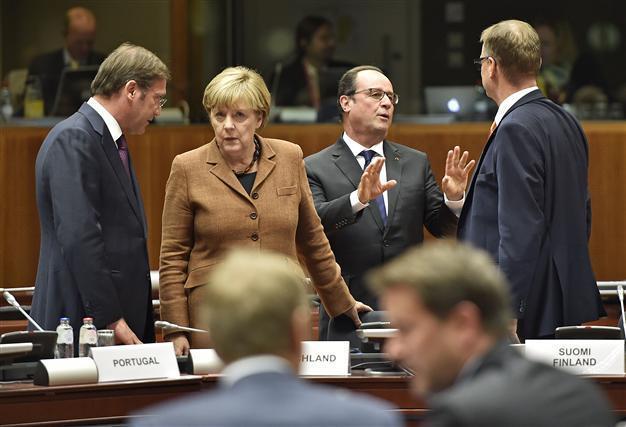EU pledges 1 billion euros to refugee crisis, seeks more dialogue with Turkey
BRUSSELS

German Chancellor Angela Merkel , center left, listens to Portuguese Prime Minister Pedro Passos Coelho , left while French President Francois Hollande, center right, talks to Finland's Prime Minister Juha Sipila, right, as they arrive for an emergency EU heads of state summit on the migrant crisis at the EU Commission headquarters in Brussels on Wednesday, Sept. 23, 2015. (AP Photo/Martin Meissner)
European Union nations have agreed at a summit held in Brussels on Sept. 23 to give an additional 1.1 billion euros in aid to the United Nations’ agencies dealing with the refugee crisis in the Syria-neighboring countries, pledging greater cooperation and dialogue with Turkey, which has become the main route of migrants trying to reach European countries.EU leaders said they would respond to the urgent needs of refugees in the region by helping the United Nations High Commissioner for Refugees (UNHCR), the World Food Program and other agencies with at least an additional 1 billion euros, according to a draft statement which came out of the summit, Agence France-Presse reported on Sept. 23.
EU President Donald Tusk had previously stated in his invitation letter to the summit the issue “could not wait” and appealed to countries to make pledges immediately.
The World Food Program needed money to provide food to 11 million people in Syria and in the region, Tusk said, adding that the program had already substantially cut food support to refugees.
British Prime Minister David Cameron said shortly after as he arrived at the summit that his country would give 40 million pounds (55 million euros or $61 million) to the program, stating “because we must make sure people in refugee camps are properly fed and looked after.”
Cameron said they could help stop migrants from thinking of making a very difficult and dangerous journey to Europe, while German Chancellor Angela Merkel said on her way into the summit that the EU had to tackle problems including “combatting hunger in the refugee camps.”
“Germany will play its part,” Merkel added.
Meanwhile, tensions escalated between Serbia and Croatia on Sept. 22, as the longtime rivals struggled to come up with a coherent way to deal with tens of thousands of migrants streaming through the Balkan nations to seek sanctuary in other parts of Europe.
Serbia banned imports from Croatia to protest Croatia’s decision to close the border to cargo as the two countries criticized each other for their handling of migrants traveling through Serbia then onto Croatia on their way to Western Europe. Croatia responded by banning all Serbian-registered vehicles from entering the country.
About half a million migrants have arrived in Europe this year, with a plan to relocate 120,000 refugees throughout the EU, despite strong objections from the Czech Republic, Hungary and Slovakia, who oppose the scheme. Slovakia has vowed to mount a legal challenge against the decision.
The European Union and its member states have pledged more than 4 billion euros ($4.5 billion) for relief and recovery assistance to Syrians in their country and to refugees and their host communities in neighboring Lebanon, Jordan, Iraq, Turkey and Egypt since the conflict began.
















